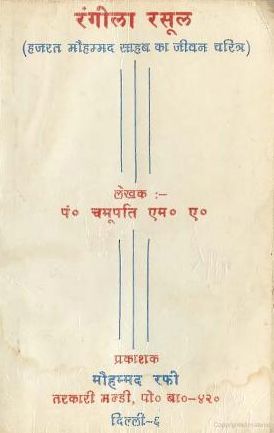
13-Jun-2024 , Updated on 6/13/2024 4:59:03 AM
Rangeela Rasool: A Contentious Intersection of Faith, Speech, and Fury
Gandhi Ji is celebrated as the greatest leader India has ever seen, guiding the country towards independence with unwavering principles and determination. His story is boldly documented in our history books. However, many aspects of his life remain shrouded in mystery. One such enigma involves the book "Rangeela Rasool," published by Rajpal Publishers in Lahore in 1923. The author of this controversial book remains unknown.
In the early 1920s, the literary landscape of India was charged with controversy. Among the storm of publications, one book stood out for its audacious content: "Rangeela Rasool." This book was published in response to three provocative titles: "Krishna Teri Gita Jalani Padegi," "Unnisvi Sadi Ka Lumpat Maharishi," and "Sita Ka Chinaala."
"Rangeela Rasool" delved into the intimate aspects of Prophet Muhammad’s marriages and his sex life as described in the Koran. At first glance, the book appeared to be a lyrical and laudatory work on Muhammad and his teachings. It opened with a poem that read, “The bird serves the flowers in the garden; I’ll serve my Rangila Rasul,” suggesting a tone of reverence. The book portrayed Muhammad as "a widely experienced" individual, symbolized by his many wives, a stark contrast to the lifelong celibacy of Hindu saints.
The publication stirred emotions and debates, its anonymous author shrouded in mystery, leaving an indelible mark on the annals of India's literary and cultural history.
For a year and a half, "Rangeela Rasool" sold widely across India. Then, in May 1924, Gandhi Ji, in his paper "Young India," strongly opposed the book, accusing its publishers of insulting Prophet Muhammad for a few extra bucks. This remark ignited riots.
Gandhi's stance revealed a perceived double standard; he had previously defended freedom of speech when Hindu texts were disparaged. The controversy escalated when the publisher of "Rangeela Rasool," Mahashay Rajpal, was dragged to the Lahore Court. Muhammad Ali Jinnah, representing the plaintiff, argued the case. The court, however, found nothing defamatory or untruthful in the book, and Rajpal was acquitted.
Undeterred, Gandhi published another provocative piece in "Young India" on August 3, 1924, subtly encouraging Muslims to seek justice outside the courts. The tension climaxed when Mahashay Rajpal was fatally attacked by a Muslim carpenter named Mohammad Ilm Din, who stabbed him multiple times in a fit of religious fervor.
Despite being in Lahore for a week after the murder, Gandhi never visited Rajpal’s family to offer condolences, nor did he write about the incident. The Hindu community, outraged, sought justice through the legal system, and Ilm Din was sentenced to death. Gandhi intervened again, pleading with the British Viceroy to commute Ilm Din’s sentence, describing him as a young, naive carpenter driven to violence by religious provocation. Nevertheless, fearing Hindu backlash, the British executed Ilm Din on October 31, 1929. Gandhi mourned this as a ‘black day’ in history.
In Pakistan, Ilm-ud-Din was celebrated as a hero, a martyr, and a holy warrior. A 1978 film lionized him, casting Mahashay Rajpal as the villain. Gandhi’s actions during this period cast a shadow over his legacy, as his unwavering support for one side deepened the divisions within a fragile nation. His decisions, perceived as biased, inflamed tensions and left the Hindu community feeling betrayed and marginalized.
The saga of "Rangeela Rasool" serves as a stark reminder that even the greatest leaders are not immune to flaws and controversies. As the poet Khalil Gibran aptly said, "Say not, 'I have found the truth,' but rather, 'I have found a truth.'" The tale of "Rangeela Rasool" and its aftermath is a testament to the multiplicity of truths that shape our collective history and the enduring struggle to reconcile them. In the end, Gandhi’s actions during this tumultuous time reveal the complexities and contradictions of leadership in a divided society, casting a shadow over his legacy that cannot be easily ignored.

Student
I am a content writter !
Join Our Newsletter
Subscribe to our newsletter to receive emails about new views posts, releases and updates.
Copyright 2010 - 2026 MindStick Software Pvt. Ltd. All Rights Reserved Privacy Policy | Terms & Conditions | Cookie Policy